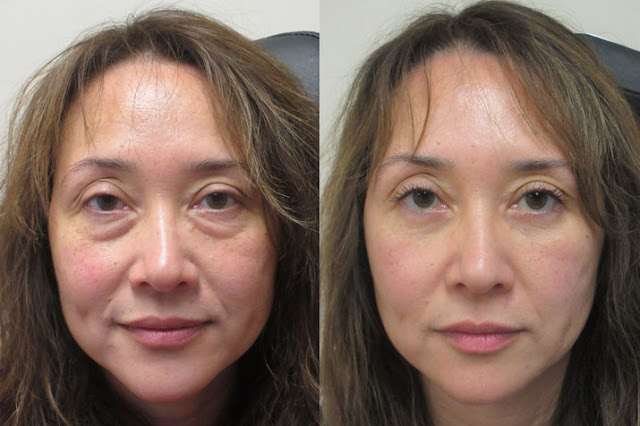Plastic Surgery Gone Wrong?
From Cosmetic Surgery and Beauty:
In November 2007, hip-hop star Kanye West’s mother, Donda West, died the day after surgery for a tummy tuck, breast reduction and liposuction in Los Angeles. In September 2007, 32-year-old Krista Stryland died following liposuction in Toronto. In 2005, Stella Obasanjo, wife of President Olusegun Obasanjo of Nigeria, died after a reported tummy tuck in the Costa del Sol in Spain. In early 2004, author Olivia Goldsmith, who wrote The First Wives’ Club, died on the operating table during a facelift at a renowned New York hospital. A month later, 56-year-old Susan Malitz died at the same hospital during a routine facelift.
With the spate of high profile cases of "cosmetic surgery gone wrong" internationally in the past few years and, very recently, here in Malaysia, where at time of writing a patient lies in a coma in a hospital after going through multiple procedures, there has been a great deal of talk about the risks involved in plastic surgery.
Because cosmetic surgery is usually done on patients who don’t have a life-threatening ailment, the risks are sometimes trivialised. It is becoming increasingly common to talk about creams, light-based treatments, wrinkle-erasing jabs, as well as surgery, all in the same breath! In some minds, facelifts, tummy tucks, botox jabs and twice-monthly facials are all on the same ‘beauty and maintenance’ to-do list.
But surgery is surgery and there will always be blood. Given that plastic surgery is about looking better, unfavourable outcomes can also be considered risks. Asymmetries, bumps and dimples, loss of sensation in surgical sites, are all possibilities. Patients must be warned and these possibilities must be weighed against the patient’s expectations.
Dr. Steve Wong has been a consultant plastic surgeon since 1983. He was head of plastic surgery at University Hospital and a founding member of the Malaysian Association of Plastic Surgeons (MAPS), which has since become the Malaysian Association of Plastic and Craniomaxillofacial Surgeons (MAPACS). For the past 15 years his practice has concentrated almost entirely on plastic cosmetic surgery. Dr. Wong screens his patients very carefully.
"To me, it is not justified to take too many risks in cosmetic surgery because I am not treating a life-threatening condition," says Dr. Wong. "My main concern is that my patient ends up safe and happy."Dr. Wong says that he turns away patients for a variety of reasons.
"Firstly, I evaluate whether they are psychologically fit for cosmetic surgery. If I think that they won’t be satisfied no matter what results I may be able to produce, I won’t operate on them.
"I also usually don’t do cosmetic surgery on teenagers unless there is a glaring abnormality or something that needs reconstruction. It isn’t so much an issue of safety, but I feel teens should wait to see how they look when they are fully developed before spending money on cosmetic surgery."
Minor vs. Major: General vs. Local
These two instances aside, Dr. Wong says that what happens after the initial consultation depends on whether a procedure is major or minor. How a procedure is classified, depends on whether it will require general or local anaesthetic.
"The checks that I do before I decide to operate, really depend on the procedure that the patient wants done," says Dr. Wong. "For minor operations which are done under local anaesthetic such as eye bag removal, double eyelids, and even some types of nose augmentation (where it is about raising the bridge on an Asian nose), I check to see that they have a good clinical history. I also consider facelifts minor procedures, because I give patients local anaesthetic and sedation for facelifts. I try to avoid giving them general anaesthetic. However, with older patients, I do prefer more thorough checks.
"I generally operate on people ranging from young adults to seniors. Many of my older patients are in income brackets where they can afford comprehensive annual check ups. If they have not had one, I usually refer them to a physician before operating," Dr. Wong adds. "With general anaesthetic (G.A.), there are a variety of things that can cause complications."
General anaesthetic has more risks attached, so pre-operative checks would be more comprehensive. Risks of general anaesthetic, while not common, include heart attack, stroke, brain damage, blood clots, temporary paralysis, obstruction of the airway and death. A good anaesthesiologist – and thorough checks on the patient’s physical state – will be able to minimise these risks.
"Examples of procedures where general anaesthetic is required are tummy tucks, liposuction, 'European' nose augmentation, breast reduction and augmentation. These operations are just too painful or long for patients to be awake. With general anaesthesia, the longer the patient is kept under, the greater the risk of complications such as blood loss, deep vein thrombosis in the legs and so on. For this reason, I don’t like to do multiple surgeries under G.A. that take a long time to complete. I prefer to spread out the operations rather than doing them all together. I would not keep a patient under G.A. for over four hours."
Specialisation
Singaporean plastic surgeon Dr. Woffles Wu feels strongly that doctors should also stick to their areas of expertise.
"Risks in surgery – this a very complicated issue," says Dr. Wu. "There are always risks in surgery – from anaesthesia, infection, or bleeding. With liposuction you can also get perforation of organs. There are GPs (general practitioners) who fearlessly do lipo because they don’t know the risks. That’s why it is important to go to someone who is properly trained in the procedure.
"We really do not believe that GPs should be doing any double eyelid or any cosmetic surgical procedures at all. In France, they have had a complete clamp down. Lipo is only done by plastic surgeons.
"Doctors should stick to their specialty. We are all given specialty training. I’m a surgeon but I have no business treating cataracts. LASIK surgery isn’t that difficult but I wouldn’t do it!"
Final Word
So, how do you minimise the risk of complications in cosmetic surgery? First, make sure you are at the peak of your health; second, check that the doctor you have chosen is well qualified to do the procedure and has done many of them before you. Ask for ‘Before and After’ photos of his past patients for that particular procedure. And third, don’t go under general anaesthesia longer than four hours and don’t do all those procedures at once. And, read our sidebar on General Anaesthetic and Pre-Operative Checks.
General Anaesthetic and Pre-Operative Checks
Dr. Steve Wong says that if a procedure requires general anaesthetic, the following are some of the considerations that patients must be aware of:
- If a patient has diabetes, it must be under control. People with diabetes usually have narrowing of blood vessels so healing takes longer. High sugar in the tissues makes them more prone to infections.
- High blood pressure may lead to more bleeding and more strain on the heart.
>> There is a high risk of complications if patients with uncontrolled diabetes and high blood pressure go under general anaesthetic. However, these are not contraindications if these conditions are under control. - Overweight people have to be thoroughly evaluated for these problems, along with people who have breathing problems such as asthma and heart problems.
- In operations where there is potential for blood loss, the patient should be checked for anaemia.
- Heavy alcohol drinkers could have problems with their liver, which can cause blood-clotting problems.
- Dr. Wong insists that smokers stop smoking at least two weeks to a month before an operation. Smoking hampers blood circulation and impairs the healing process and may lead to skin necrosis. Dr. Wong says, "I have had patients who lied to me about this, which is really stupid. You want the best results when you have cosmetic surgery, right? Why put that at risk?"
- Patients on supplements such as ginkgo biloba, vitamins A and E, and ginseng, should stop these at least a week before any operation as they cause blood thinning and may lead to excessive bleeding.
- Patients on aspirin must also stop taking it five days to a week beforehand. If these medications are necessary, the patient must obtain a letter from their cardiologist that confirms that they are allowed to stop for five days before the operation. Aspirin is also a blood thinner.


Comments